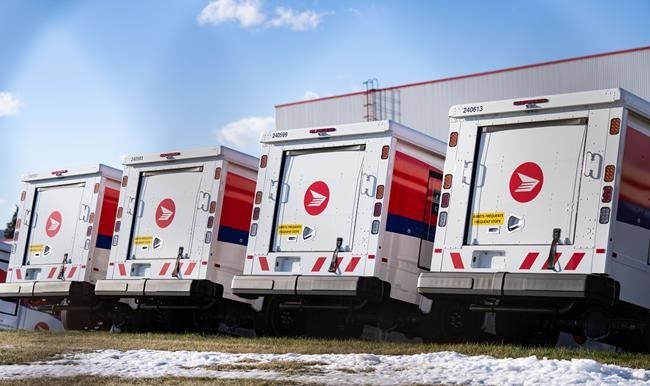
Canada Post trucks are seen in a distribution centre in Montreal on December 13, 2024. THE CANADIAN PRESS/Christinne Muschi
Republished December 16, 2024 - 3:48 PM
Original Publication Date December 16, 2024 - 1:06 AM
OTTAWA - Mail is set to begin moving again on Tuesday after a month-long strike by Canada Post employees comes to a close, even as the union representing postal workers challenges the intervention in the labour dispute.
Canada Post has warned Canadians should expect delays into the new year as it resumes operations.
Though operations will technically resume Tuesday, Canada Post said it will take more time to clear the backlog of packages and letters that were paused when the strike began. It will not receive or pick up new products until Thursday, and will start accepting new international mail on Dec. 23.
Canada Post said Canadians should expect delays into January, and added post office hours of operation may vary while service guarantees will be suspended as the company ramps up operations.
After a two-day hearing, The Canada Industrial Relations Board declared the union and Crown corporation were at an impasse. It ordered the postal workers back on the job, with a deal to be hammered out in the coming year.
But the key issues at the centre of the dispute still remain heading into the next phase of negotiations.
More than 55,000 workers went on strike Nov. 15 after negotiations between the Canadian Union of Postal Workers and Canada Post failed to produce a deal.
Calls for government intervention grew, and for four weeks the federal government insisted it would stay out of the dispute.
But on Friday, Labour Minister Steven MacKinnon directed the Canada Industrial Relations Board to order the 55,000 picketing employees back to work within days if it determined a deal wouldn't be possible before the end of the year.
In the meantime, the government would appoint an industrial inquiry commission to look into the bargaining issues and come up with recommendations by May 15 on how a new agreement can be reached.
"The inquiry will have a broad scope, as it will examine the entire structure of Canada Post from both a customer and business model standpoint, considering the challenging business environment now facing Canada Post," MacKinnon said.
He characterized the move as a "timeout" for the two parties, as they had been swapping proposals and criticisms but didn't seem to be moving any closer together.
On Sunday, Canada Post said after two days of hearings over the weekend, the board declared an impasse between the two parties.
It said union members have been ordered back to work under their existing contracts, which have been extended until May to allow the bargaining process to resume.
However, Canada Post and the union agreed to implement a five per cent wage increase, retroactive to the day after the collective agreements expired.
The union said in a bulletin Monday evening that it is challenging the intervention into the strike, and that its challenges will be heard by the labour board on January 13 and 14.
Key issues in the dispute include the size of wage increases and a push by Canada Post to expand delivery to the weekend.
The two sides have been at odds over how to staff the expansion.
Canada Post has pitched the expansion as a way to boost revenues and compete with other carriers. The corporation has been losing money for years.
It has said it would staff weekend delivery shifts with a mix of new permanent part-time positions and some full-time, creating flexibility but keeping costs down.
However, the union has characterized this as an attack on full-time work.
As the strike wore on, business groups had been calling on the government to intervene as companies and individuals scrambled to find alternative modes of delivery with the holiday shopping season in full swing.
The union decried the federal government's decision to step in, saying it tramples on workers' rights to bargain and strike.
It said MacKinnon's intervention was part of a troubling pattern in which the government lets employers off the hook from bargaining in good faith with workers and their unions.
It's not the first time that power to intervene in other recent labour disputes, in those cases directing the board to not only order workers back to work but also to order binding arbitration.
It's a move that the labour movement has strongly criticized, and legal challenges are underway from the unions involved in the other disputes.
This report by The Canadian Press was first published Dec. 16, 2024.
News from © The Canadian Press, 2024